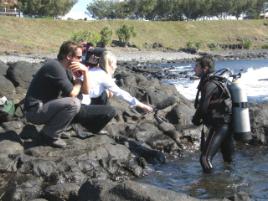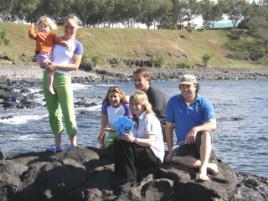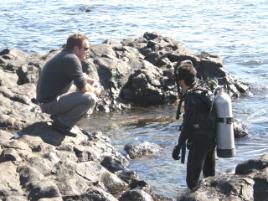New diver code to protect corals and other marine organisms
Published on 27 June, 2008
Researchers from CQUniversity's Centre for Environmental Management have developed a Diver Code of Practice in conjunction with dive and ecotourism operators, to help protect fragile marine organisms.
Although diving on coral reefs is fun and enables us to visit beautiful and mystical places, we are potentially disturbing and/or damaging wildlife and therefore need to take care and follow the simple Code of Practice.

The new code launch attracts media interest
Some coral species take decades and even centuries to become the size that we see today and they are extremely fragile and are easily damaged. Furthermore, collecting souvenirs can easily deplete resources and the beauty of a reef.
Recent surveys amongst divers showed that:
- Less than 11% of divers rated their own knowledge about coral reefs as very good
- 38% of divers indicated that they were aware of diving regulations, however, 21% responded incorrectly when asked whether or not certain activities were permitted
- 25% of divers thought that activities including underwater photography had no impact on coral reefs, yet research has shown that divers can bring about profound alteration to reef structure and animal behavior
By learning more about coral reefs and responsible diving practices you are less likely to damage coral reefs. The Code of Practice was made possible through a grant provided by the Burnett Mary Regional Group for Natural Resources Management (BMRG).

All smiles at the launch
The Code of Practice provides divers with simple guidelines to minimize their impact on coral reefs and their inhabitants. Examples of the codes include:
- Act responsibly when diving and use ‘common sense'
- Practice good buoyancy and body control, keeping a safe distance from corals and other marine life, particularly in currents or surge
- Always dive with a buddy and check their gear as well as your own
- Make sure gauges, weight belt and other gear are secured so that they do not dangle, risking entanglement and cause damage to corals or other marine life
- Watch your fins! Never stand or walk on living coral or other marine organisms
These simple guidelines ensure that we can continue to have fun on our reefs, and protect our wildlife for future generations.
For a copy of the Code, contact Dr Sander Scheffers at CQUniversity's Centre for Environmental Management on s.scheffers@cqu.edu.au, Bundaberg Aqua Scuba http://www.aquascuba.com.au/padi/deep-explorer.htm, 1770 Reef Explorers: reefexplorers@gmail.com, Lady Elliot Dive: http://www.ladyelliot.com.au/, Burnett Mary Regional Group http://www.bmrg.org.au/ or your local council.

Discussing the new code

